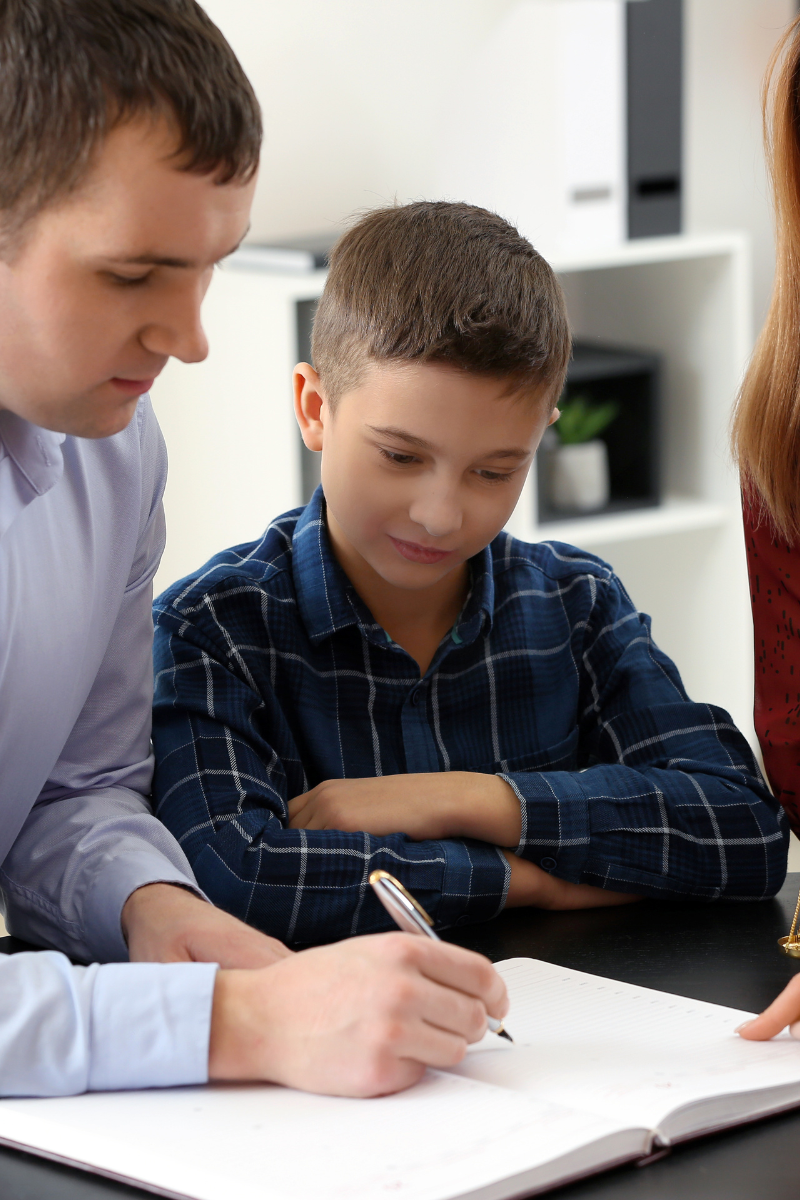Top Illinois Divorce Attorney: Helping Children Deal with the Stress of a Divorce
As a top divorce attorney in Illinois, Masters Law Group understands that ending a marriage isn’t just a legal event—it’s an emotional journey that affects the entire family; especially children.
Divorce can take a heavy emotional toll on children, often leaving them feeling anxious, confused, or withdrawn. That’s why it’s crucial to have a legal team that not only protects your rights but also prioritizes your child’s well-being. Our mission goes beyond legal representation. We’re here to help families find clarity, stability, and support during one of life’s most challenging transitions.
In this blog, we’ll explore how divorce impacts children, ways parents can reduce stress during the process, and how working with a top divorce attorney can make a lasting difference.
 The Emotional Impact of Divorce on Children
The Emotional Impact of Divorce on Children
Divorce is considered one of the most significant life stressors for children. It can upend their sense of security, alter daily routines, and reshape family dynamics profoundly. While every child responds differently, the psychological impact of divorce often manifests in a few common ways. According to the American Academy of Pediatrics, children may show:
- Anxiety or depression
- Anger or irritability
- Withdrawal from social activities
- Academic struggles
- Sleep disturbances
These signs can emerge gradually and vary based on the child’s age, personality, emotional maturity, and how the parents navigate the separation process. Children may also struggle with uncertainty and fear about the future—questions like “Where will I live?” or “Will I still see both parents?” can weigh heavily on their minds. That’s why proactive parental support and a well-structured parenting plan are essential.
When to Seek Support
When to Seek Additional Support
Even with your best efforts, some children may need extra help navigating this emotional upheaval. Watch for signs such as:
- Prolonged sadness or anxiety.
- Behavioral regression.
- Academic decline or loss of interest in activities.
- Self-harm or talk of hopelessness.
- Persistent anger or defiance.
If these signs persist, early intervention through a licensed child therapist or counselor can be instrumental in helping them develop healthy coping strategies and emotional resilience. At Masters Law Group, our top divorce attorneys can help you identify signs that your child may need professional support and connect you with trusted local resources.
Helping Children Cope: What Parents Can Do
While legal matters are being resolved, it’s crucial to address the emotional needs of your children. Here are key ways parents can help reduce the stress of divorce:
1. Maintain Open Communication
Children need age-appropriate explanations and reassurances. Let them know the divorce is not their fault and both parents still love them. Use simple, clear language. Avoid blaming the other parent or oversharing adult issues.
2. Create Consistency and Routine
Stability helps children feel secure. Keep school routines, meal times, and bedtimes consistent across households when possible.
3. Encourage Emotional Expression
Give your child permission to feel sadness, anger, or fear. Help them find healthy outlets such as journaling, art, or talking to a therapist.
4. Avoid Conflict in Front of Children
One of the most damaging aspects of divorce is exposing children to parental conflict. Shield them from arguments, legal discussions, and emotional outbursts.
5. Co-Parent Respectfully
Work toward a co-parenting plan that prioritizes the child’s needs. Be cooperative, flexible, and respectful in your communication with your ex-spouse.
 The Role of a Top Divorce Attorney in Supporting Families
The Role of a Top Divorce Attorney in Supporting Families
Working with a top divorce attorney can help significantly influence how a divorce affects your child. At Masters Law Group, we prioritize family-focused legal solutions that support emotional and legal outcomes.
Legal Tools That Help Protect Children During Divorce
In any divorce involving children, the court’s primary concern is the best interest of the child. Fortunately, there are several legal mechanisms in Illinois designed to help protect children during this sensitive time and help families establish a clear path forward.
1. Parenting Plans
A parenting plan is a written agreement that outlines how parents will raise their child after separation or divorce. This plan typically includes:
- A detailed schedule of parenting time.
- How major decisions will be made regarding the child’s education, healthcare, and religious upbringing.
- Guidelines for communication between parents and with the child.
- Provisions for resolving future disputes or modifying the plan.
A comprehensive parenting plan helps eliminate ambiguity, reduce conflict, and give children the structure they need to feel secure and supported.
2. Allocation of Parental Responsibilities
Illinois law no longer uses the term “custody.” Instead, the focus is on the allocation of parental responsibilities, which refers to how decision-making authority is shared or divided between parents. The court evaluates factors such as:
- The child’s relationship with each parent.
- Each parent can make decisions in the child’s best interest.
- The willingness of each parent to facilitate a relationship between the child and the other parent.
By clearly defining who is responsible for what, the law promotes consistency in the child’s life, even in two separate households.
3. Mediation
Mediation is a confidential process where a neutral third party helps parents reach agreements on issues like parenting time and decision-making responsibilities. It is often required in contested family law matters and offers several benefits:
- Encourages cooperation instead of confrontation.
- Minimizes courtroom stress and delays.
- Helps parents create mutually beneficial solutions.
- Often results in better long-term co-parenting relationships.
Most importantly, by reducing parental conflict, mediation can protect children from emotional distress caused by adversarial litigation.
4. Guardian ad Litem (GAL)
In high-conflict cases or when a child’s safety or well-being is in question, the court may appoint a Guardian ad Litem (GAL)—a specially trained attorney who represents the best interests of the child. A GAL will:
- Reviewing important documents, including school records, medical reports, and family history.
- Evaluating the family dynamic and the child’s unique needs.
- Making a formal recommendation to the court regarding parenting time and decision-making authority.
Work With Masters Law Group
At Masters Law Group, Erin E. Masters is a court-appointed Child Representative and has experience advocating for children in these high-conflict matters. Further, she has also been appointed by the Circuit Court of Cook County to mediate complex family law cases. Since 2016, Ms. Masters has been named “Rising Star” by Illinois Super Lawyers and has been named as an “Emerging Lawyer” by Leading Lawyers. In 2020, Ms. Masters was named “Super Lawyer” by Illinois Super Lawyers.
Partner Anthony G. Joseph is an active trial lawyer whose practice focuses exclusively on Family Law, with a particular emphasis on International Child Abduction and cross-border custody issues pursuant to the Hague Convention of 1980 and the UCCJEA.Helping children deal with the stress of divorce requires compassion, consistency, and a proactive legal strategy. With the right support system—including working with a top divorce attorney—you can guide your family toward a healthier future. At Masters Law Group, we don’t just handle your case. We help you move forward. Here’s how we stand apart:
- Client-Centered Representation: We take the time to understand your unique family dynamics and tailor our legal strategies accordingly.
- Child-Centered Advocacy: Our attorneys have experience navigating parenting time (visitation) and parental responsibilities.
- Mediation: Whenever possible, we recommend mediation to avoid lengthy court battles that increase stress for children.
- Comprehensive Support: We offer resources and referrals to child therapists, counselors, and family coaches to help families adjust during and after divorce.
Let us help you take the next step with confidence. Contact our team today to schedule your complimentary consultation.
Frequently Asked Questions (FAQ)
How can I explain divorce to my child without causing more stress?
Use age-appropriate language, be honest but reassuring, and emphasize that they are not to blame. Avoid involving them in legal or emotional conflicts. At Masters Law Group, we provide guidance on navigating these sensitive conversations. Our top divorce attorneys connect you with trusted child therapists or family counselors to support your child’s emotional well-being throughout the divorce process.
Can children choose which parent they want to live with in Illinois?
Courts consider the child’s wishes, especially if they are mature enough to express a preference, but the final decision is based on their best interests. Our top divorce attorneys are well-versed in presenting the child’s preferences to the court in a respectful and strategic way while ensuring that your case is focused on the overall well-being and best interests of your child.
How can I co-parent effectively with a difficult ex-spouse?
Focus on respectful communication, consistency in household rules, and always prioritizing your child’s needs. Consider using a parenting app to facilitate communication. Our top divorce attorneys provide legal frameworks and resources for successful co-parenting—even in high-conflict situations. We also offer mediation services to help you and your ex-spouse find common ground and reduce tension.
Should I take my child to a therapist during the divorce?
If your child is showing signs of stress, anxiety, or behavioral changes, therapy can provide a safe space to express their feelings and develop coping strategies. At Masters Law Group, we can recommend trusted mental health professionals who specialize in working with children of divorce and help incorporate supportive arrangements into your parenting plan.












